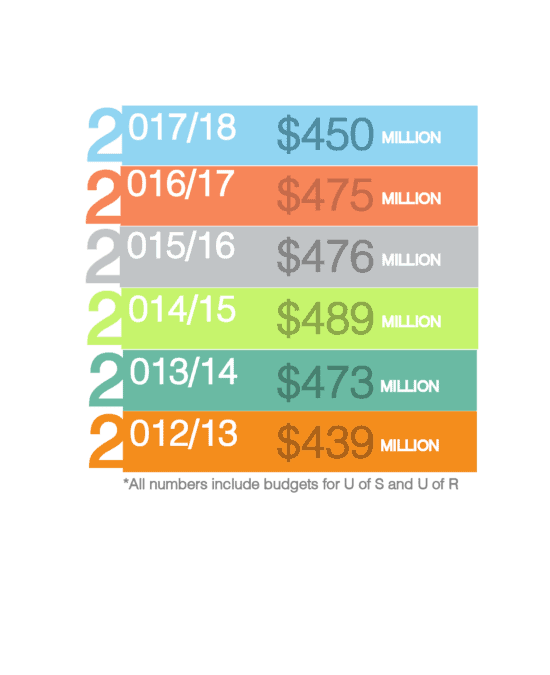The provincial government’s new budget was released on March 22, and with it came cuts in funding to services all across the province in order to reach the Saskatchewan Party’s goal of balancing the budget in three years.
The University of Saskatchewan’s provincial funding has been cut by 5.6 per cent, the largest funding cut that the U of S has ever seen. With this announcement, both the staff and students are wondering what the results of the provincial budget will mean for them.
While many students are concerned about a potential rise in tuition, U of S president Peter Stoicheff says that this will not be a concern for the next school year.
“The tuition rates for this coming year have already been approved by the board of governors. We are always careful to set our tuition rates before the budget comes out so that we’re not waiting for a budget and then determining how high tuition should be as a result of the budget,” Stoicheff said.
a budget and then determining how high tuition should be as a result of the budget,” Stoicheff said.
Cuts to programing may also be a concern for students, but there are no major programs that will be cut as of now, according to Stoicheff.
“We’re looking at this differentially, based on what is really important to the university, based on what students need and the different colleges’ financial capacity,” Stoicheff said. “Different colleges and different administrative units will be asked to absorb different levels of cuts.”
Stoicheff believes that one year’s budget will not have a significant impact on the U of S’s contributions to the province.
“[The U of S has] a significant economic impact on the province and the province would be poorer if it did not have the university,” Stoicheff said. “We will make sure that we stay true to who we are and just as we’re going to try to lessen the impact on students, we are going to try to lessen the impact on the province.”
Len Findlay, a professor in the U of S English department, believes that this is an opportunity for students to collectively have their voices heard by the provincial government.
“The upside for students is collective political mobilization in the name of unfairness, government expediency and mismanagement, and what amounts to a broken social contract with young people in, or new to, Saskatchewan,” Findlay said, in an email to the Sheaf.
Although Stoicheff and the senior administration will be forced to make some tough decisions, Findlay feels it is important to put the responsibility on the provincial government rather than university administration.
“The damage inflicted will be the responsibility of government, not our president or any sector or sectors of the campus community,” Findlay said.
Stoicheff remains confident that the university will continue to prosper despite this year’s large budget cut, but he is concerned about what will happen if the provincial government cuts additional funding in the future.
“A one-year tough budget — we’re going to handle that. If this was a signal that we’re going to continue to get cut year after year, and if it’s a signal that the government doesn’t value our contribution to the province, there’s a whole different answer,” Stoicheff said.
Although this budget is unprecedented for the university, Stoicheff emphasizes that the impact on students will remain as minimal as possible.
“We’ve never seen a budget like this one before, but I’m trying to reassure people that we are really intent on staying true to the mission and the vision of the university and this budget will not define or redefine who we are and change us from the kind of university that we are,” Stoicheff said.
Despite Stoicheff’s reassurance that the budget will not define the university, Findlay urges students to unite with other, take action and speak out about the cuts.
“Each of us should seriously consider doing two things: doing what we were already committed to doing with undiminished enthusiasm and resolve, and speaking truth to power,” Findlay said. “A student body and leadership that realizes its own power and popular support does not have to sit meekly by while events and policies turn against their best interests and reasonable expectations.”
—
Lyndsay Afseth
Graphics: Lesia Karalash / Graphics Editor
Leave a Reply